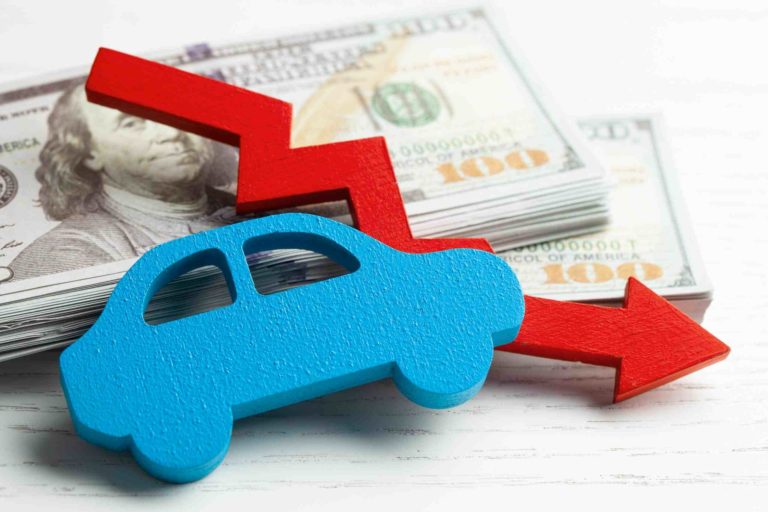Your Car’s Telematics Can Lower Your Car Insurance Costs
The next time you buy an automaker’s new car, truck or SUV, you can also buy insurance.
Selling insurance could become a new profit center for automakers, as companies like Tesla and GM expand their efforts to sell it. The move is when data generated by the car itself is used not only to provide lower insurance premiums, but also to ensure consumer loyalty.
Over the past few years, at least 17 OEMs have released telematics-based insurance packages, all of which use the vehicle’s built-in telematics that collects driving data to provide discounts based on the driver’s driving behavior.
This technology is hardly new. For nearly a decade, Progressive Insurance has offered policyholders the opportunity to install a device in their vehicle’s diagnostic port that tracks their driving behavior and adjusts their rates. But now it’s reaching the car’s instrument panel – specifically, its telematics system.
As a result, Ford, GM, Hyundai, Kia, Mercedes-Benz, Stellantis, Tesla, Toyota and Volkswagen offer car insurance. In addition, many car manufacturers have partnered with insurance companies, including Ford and Arity, GM and American Family, Ford and Octo Telematics, PSA and AXA, Daimler and SwissRE.
“Insurance usually represents 10%-15% of the total cost of vehicle ownership. So the ability to reduce this will have a major positive impact on our OEM sales,” said Andrew Jackson, Ph.D., director of research at Ptolemus Consulting Group, which recently released the study of connected car insurance.
Technology drives new policies
Contents
- 1 Technology drives new policies
- 2 What’s in it for OEMs
- 3 Can you get cheaper car insurance by calling?
- 4 Can insurance companies put a tracker on your car?
- 5 Is it worth putting a tracker to my car?
- 6 Does a tracking device lower insurance?
Among the innovative new products promoting telematics technology are policies with rates that are not only based on the owner’s driving habits, but that use the car’s telematics to determine how far the owner drives. Known as pay-per-mile car insurance, the cost is based on how many miles the car owner drives. This may interest you : UK motor insurance premiums in first quarter at highest level since 2020 – survey. Customers are charged a fixed monthly base fee and a variable monthly mileage rate, meaning your monthly mileage fee changes based on the number of miles you drive each month.
Your insurance also tracks your driving behavior, including what time you travel, whether you use your phone while driving, and whether you brake quickly or accelerate quickly. This technology is hardly new. For nearly a decade, Progressive Insurance has offered policyholders the opportunity to install a device in their vehicle’s diagnostic port that tracks their driving behavior and adjusts their rates. But now it’s reaching the car’s instrument panel – specifically, its telematics system.
But drivers are increasingly looking to lower insurance costs, especially in battery electric vehicles (BEVs), which tend to be more expensive to insure than conventional cars. Part of the reason is quite simple: BEVs cost a lot to buy, which affects the cost of your insurance. But beyond that, special tools and training are required to repair them, incurring repair costs, and insurance. And insurers are wary due to the speed of off-the-line BEVs.
But how far these OEM programs progress depends on privacy laws, which the government is increasingly concerned about. Whether there will be regulations that will strangle this nascent revenue stream remains to be seen.
What’s in it for OEMs
Some companies, such as GM already offer traditional car insurance, regardless of the car brand. But the use of telematics can help GM process claims much faster than the average 18-to-25 days. This may interest you : 24 auto insurance discounts worth asking about your insurance today. They hope to be able to immediately find out about the damage caused by the accident and settle it faster, which reduces the cost of insurance.
The trend towards cars offering insurance started with Tesla, which receives data on how its vehicles are driven. This allows Tesla to provide feedback to drivers, resulting in significantly reduced accident rates, thus lowering insurance costs. It also helps with brand loyalty.
This is the type of connected car service that most drivers and OEMs would consider profitable, as opposed to other subscription-based models that have a stealthy look and feel. Recently, BMW took heat after suggesting that buyers pay a subscription fee to use heated seats in their cars, seats that buyers have already paid for but cannot use without paying BMW more.
The company also charges for using Apple CarPlay. Consumers have been resistant to such schemes, but seem more willing to pay an automaker to enable its technology to reduce insurance costs or increase safety or maintenance costs.
And connected car insurance could prove beneficial for OEMs selling to fleet buyers, where total cost of ownership is the biggest factor influencing purchases. Reducing insurance costs will no doubt help sales in this segment.
Finally, it is the data generated by vehicle telematics that is driving new revenue opportunities, particularly OEM auto insurance. It’s a trend that could unwittingly save drivers money — and even more other expenses.
Can you get cheaper car insurance by calling?
Is it better to call car insurance? It is a good idea to call and get a quote from your car insurance agent to see what the price will be if you add a vehicle. To see also : Gender gap in car insurance premiums – who pays more?. It works the same if you are selling a vehicle, your agent can tell you how much your savings are.
Can you ask your insurance company to lower your rate?
Can You Negotiate Car Insurance Rates? The simple answer is that you can not negotiate rates since prices and the insurance industry are heavily regulated by each state. The insurer cannot change its range of rates without a review of the situation along with evidence that the change is necessary.
Can insurance raise rates for no reason?
Insurance companies take factors beyond your car and personal driving habits into account when determining your rates. For example, the following factors can cause your insurance bill to go up for no reason: Crime rate. Accidents are often caused by distracted drivers.
What should I not tell the insurance company?
Do not give out the name of anyone involved in the accident. It is not your responsibility, and since you do not have all the facts, what you reveal may be incorrect. If your insurance company wants your name, tell them they can talk to your lawyer, if you have one, or just say you don’t know.
How do you negotiate insurance payouts?
Let’s take a look at how to best position your claim for success.
- Have a Number of Places in Mind. …
- Don’t Jump at the First Offer. …
- Get an Adjuster to Justify Low Bids. …
- Emphasize emotional points. …
- Put the Settlement in Writing. …
- More information on Negotiating your personal injury claim.
How can I get a lower rate on my car insurance?
Here are some ways to save on car insurance1
- Increase your deductible.
- Check the discount you qualify for.
- Compare car insurance quotes.
- Maintain a good driving record.
- Participate in a safe driving program.
- Take a defensive driving course.
- Explore payment options.
- Improve your credit score.
At what age is car insurance cheapest?
Once young drivers gain more experience and reach the age of 25, their car insurance costs drop by around 33%. Costs continue to generally decrease with each iteration. Once the driver reaches the age of 50, they will see their best rates. Around the age of 60, however, car insurance costs start to rise and compare to what drivers see in their 40s.
What is the cheapest car insurance company for young drivers?
Cheapest Car Insurance for 17-Year-Olds – National At the state level, GEICO and Allstate are still your best bets for affordable coverage for 17-year-olds. GEICO is the cheapest company in 20 states and Allstate is the cheapest in 17.
Is it better to call or go online for car insurance?
It can be cheaper to buy car insurance online than through an agent, if you are willing to do the work of understanding and comparing policies. Using an agent can cost you 5% to 20% extra on a new policy in the first year and 2% to 15% each time you renew, according to some sources.
Is buying an auto policy online cheaper?
Some insurers, like Progressive, even offer discounts for buying policies online. You can also save hundreds of dollars by comparing insurance prices online. By comparing online quotes from several insurers, you can save more than $465 per year.
Is it safe to get car insurance quotes online?
Reviewed by Shannon Martin, Licensed Insurance Agent. âBuying car insurance online is just as safe as buying with a broker. In many cases, it’s a lot more work and can save you time and money.
Can insurance companies put a tracker on your car?
Many insurance companies offer car insurance monitoring devices that connect to your smartphone and monitor your driving habits. Here at American Family Insurance, we use a smartphone app that can monitor your driving habits without requiring a separate âtelematicsâ device.
Can someone put a tracker on your car without you knowing? Most trackers are added by the owner, but any person can equip a vehicle with such a device without the owner’s knowledge or consent. If you suspect that your vehicle has been equipped with a GPS Tracker without your knowledge, there are a few simple steps to determine if you are being tracked.
How do I know if I have a tracking device in my car?
You should carry a flashlight so you can see into the dark crevices of your wheel wells and undercarriage—two common places to hide a GPS tracker. After looking around the outside of the vehicle, check the interior. Pay special attention to: Data port under the dashboard and steering wheel.
How do you detect if a GPS tracker is placed in your vehicle?
How to Find Out If a GPS Tracker Is Installed on Your Vehicle
- Check Your Vehicle’s Exterior. The shadow. …
- Check In Your Car. Check the data port. …
- Using Bug Sweeper. Electronic bug sweepers detect electromagnetic signals similar to those produced by cell phones and radio transmitters.
Why would car insurance need to give you a tracker?
Typically, insurance companies provide the device as part of a usage-based insurance (UBI) program. Once installed, insurers will use it to collect key metrics, such as speed, braking, and mileage, to determine highly personalized premiums.
Why would there be a tracking device on my car?
GPS trackers for vehicles use satellite navigation data to provide real-time information about your car’s location, speed, direction, and distance. Benefits of personal vehicle tracking include theft protection, increased safety for teenage drivers, and insurance discounts.
What does insurance tracking mean?
Related Definitions Tracking insurance means monitoring evidence of insurance in collateralized credit transactions to determine whether the insurance required by the credit agreement has lapsed, and communicating with debtors about the status of insurance coverage.
Why do insurance companies want to track your driving?
What Do Insurers Do With The Data They Track? Insurance companies use your data to determine whether you are a safe driver. For example, policyholders who frequently speed while using their cell phones have a greater risk of accidents.
Can insurance track your location?
Data on speed and mileage helps insurers determine your driving patterns. Insurance companies can also use these devices to track where you park and places you frequent.
Why do insurance companies track you?
What Do Insurers Do With The Data They Track? Insurance companies use your data to determine whether you are a safe driver. For example, policyholders who frequently speed while using their cell phones have a greater risk of accidents.
Do insurance companies track your location?
Speed isn’t the only thing an insurance tracker can monitor. Here are some pieces of data that can be tracked: The location of your car. The date and time of your trip.
Does your car record your location?
But it’s not just the data in your infotainment system that’s a concern. All the data discussed above—the GPS coordinates of each gear change, the location of each ECU boot—are not only stored in the car itself, but are often sent back to the car manufacturer for storage and analysis.
Is it worth putting a tracker to my car?
Most would agree that getting help quickly in an emergency is the most important benefit of a GPS tracker. With a vehicle tracking device, if you’re stranded or in an accident, you can tell emergency personnel where you are.
Is it good to have a tracker in your car? Having a tracking device installed in your car is one of the most reliable and efficient ways to protect against crime. Although they can be quite expensive, these devices will lower your insurance premiums and can save you a lot of hassle, in the long run, if your vehicle is stolen.
Where is the most common place to put a tracker on a car?
In the Seat: Placing the tracker under the driver’s or passenger’s seat is one of the easiest ways to monitor the vehicle without needing to catch it. Some people check under their seats, so this location provides peace of mind, as well as accurate GPS readings.
How do you know if your car has a tracker installed?
You should carry a flashlight so you can see into the dark crevices of your wheel wells and undercarriage—two common places to hide a GPS tracker. After looking around the outside of the vehicle, check the interior. Pay special attention to: Data port under the dashboard and steering wheel.
Where are car trackers usually placed?
You can install a GPS tracking device almost anywhere in your car or fleet vehicle- on the front or rear bumper, wheel wells, under the mats or seats, or in the glove compartment. However, for fleet tracking purposes, GPS trackers are almost always installed on the dashboard through an on board diagnostics (OBD) port.
How do you tell if someone’s put a tracker on your car?
Check Exterior Using a flashlight, check both front and rear wheel wells. Use your hands to feel in areas that are not easily visible. If the tracker is in the wheel well, the magnet must be attached to the metal part, so look behind the plastic cover that does not need to be removed.
Is putting a tracker on a car stalking?
A person who places a tracking device on someone’s vehicle without permission will be considered a stalker.
Can you put a tracker on someone’s car without them knowing?
It is an offense for a person to knowingly install, conceal, or place or use an electronic tracking device in or on a motor vehicle without the consent of the operator and all occupants of the vehicle for the purpose of monitoring or following the operator, occupant, or occupants of the vehicle.
Can you go to jail for putting a tracker on someone’s car Florida?
Penalties for Illegal Installation of Tracking Devices or Apps. The Felony of Illegal Installation of a Tracking Device or Tracking Application is a Second Degree Misdemeanor punishable by up to sixty (60) days in jail, six (6) months of probation, and a $500 fine.
Does a tracking device lower insurance?
Many major insurance companies offer discounts of more than 30 percent on insurance costs for businesses that implement tracking solutions.
Should car insurance give you a tracker? Typically, insurance companies provide the device as part of a usage-based insurance (UBI) program. Once installed, insurers will use it to collect key metrics, such as speed, braking, and mileage, to determine highly personalized premiums.



